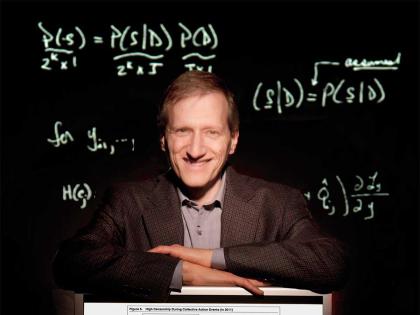Saving Higher Education in the Age of Money, by James Engell ’73, Ph.D. ’78, Gurney professor of English and professor of comparative literature, and Anthony Dangerfield (University of Virginia Press, $27.95). Increasingly, learning is no longer the reason to pursue or practice higher education, write the authors. Through analysis of admission practices, salaries, student attitudes, tuition costs, research programs, and so on, they detail how the pursuit of money has transformed the academy.
 |
| Sailors and señoritas on an American wallpaper |
| From the book |
Off the Wall: Wonderful Wall Coverings of the Twentieth Century, by Lena Lenc˘ek, A.M. ’72, G ’83, and Gideon Bosker (Chronicle Books, $22.95, paper). A visual treat. The authors place each of the 150 designs, many from major museum collections, in cultural context. Wallpaper is an artistic medium to be reckoned with: as Oscar Wilde said on his death-bed, “Either that wallpaper goes or I do.”
Creative Healers: A Collection of Essays, Reviews, and Poems from The Pharos, 1938-1998, edited by Edward Day Harris Jr., M.D. ’62 (Alpha Omega Alpha Honor Medical Society, 525 Middlefield Road, Menlo Park, California 94025, $40). A rich anthology of pieces in the medical humanities, culled from 60 years of an honor-society journal, including works by Harvardians such as Lewis Thomas, Helen Taussig, and John Knowles.
The Nature of Sacrifice: A Biography of Charles Russell Lowell, Jr., 1835-64, by Carol Bundy (Farrar, Straus and Giroux, $35). Lowell, A.B. 1854, died in the war his family, full of Harvardians, helped fashion to be about slavery.
The Competition Solution: The Bipartisan Secret behind American Prosperity, by Paul A. London ’58, M.P.A. ’69, Ph.D. ’74 (AEI Press, $25). For the past few decades, politicians have promoted competition in the American economy, and it is competition, London writes, more than monetary or tax policy, that has led to prosperity. More competition is wanted in healthcare and education.
Against Depression, by Peter D. Kramer ’70, M.D. ’76 (Viking, $25.95). Westerners traditionally have perceived depression as ennobling, and melancholy as romantic. Kramer, a clinical professor of psychiatry at Brown, finds nothing at all heroic about the pervasive disease.
 |
| Pathbreaking highway design for the Bronx River Parkway |
| From the book |
America’s National Park Roads and Parkways: Drawings from the Historic American Engineering Record, edited by Timothy Davis ’80, Todd A. Croteau, and Christopher H. Marston (Johns Hopkins University Press, $55). This massive volume surprises and charms with old-fashioned-drawings of bridges, tunnels, switchbacks, guard walls, and the like, many drawings with profuse incidental details such as cute little steamrollers, construction joinery, and the horse-drawn coach that once carried visitors to Yosemite.
The Orientalist: Solving the Mystery of a Strange and Dangerous Life, by Tom Reiss ’86 (Random House, $25.95). An intriguing biography of Lev Nussimbaum, a Jew from exotic Baku who styled himself a Muslim prince and became a literary lion in Hitler’s Germanybut the fascists caught onto him. Stranger than fiction.
African Voices of the Atlantic Slave Trade: Beyond the Silence and the Shame, by Anne C. Bailey ’86 (Beacon Press, $26). The author is assistant professor of history at Spelman College. She uses oral narratives40 interviews with chiefs and elders in Ghanato examine the history of domestic slavery in Africa and to explore why Africans came to sell other Africans into transatlantic slavery.
And Tango Makes Three, by Justin Richardson ’85, A.M.-M.D. ’90, and Peter Parnell, illustrated by Henry Cole (Simon & Schuster, $14.95). Roy and Silo are two male penguins in New York’s Central Park Zoo. Attracted to each other, they become a committed couple, build a nest, and attempt to hatch an egg-shaped stone. Finally, a zookeeper gives them a real, fertilized, but homeless egg to mind. The result is Tango, probably the first chinstrap penguin to be raised by two dads. For children four through eight, a tender tale, and guess what? It’s true.
Harvard Rules: The Struggle for the Soul of the World’s Most Powerful University, by Richard Bradley, A.M. ’90, G ’93 (HarperCollins, $25.95). An anecdotal and often negative assessment of Lawrence H. Summers and his Harvard presidency, as of Commencement 2004, by a former editor at George magazine.








